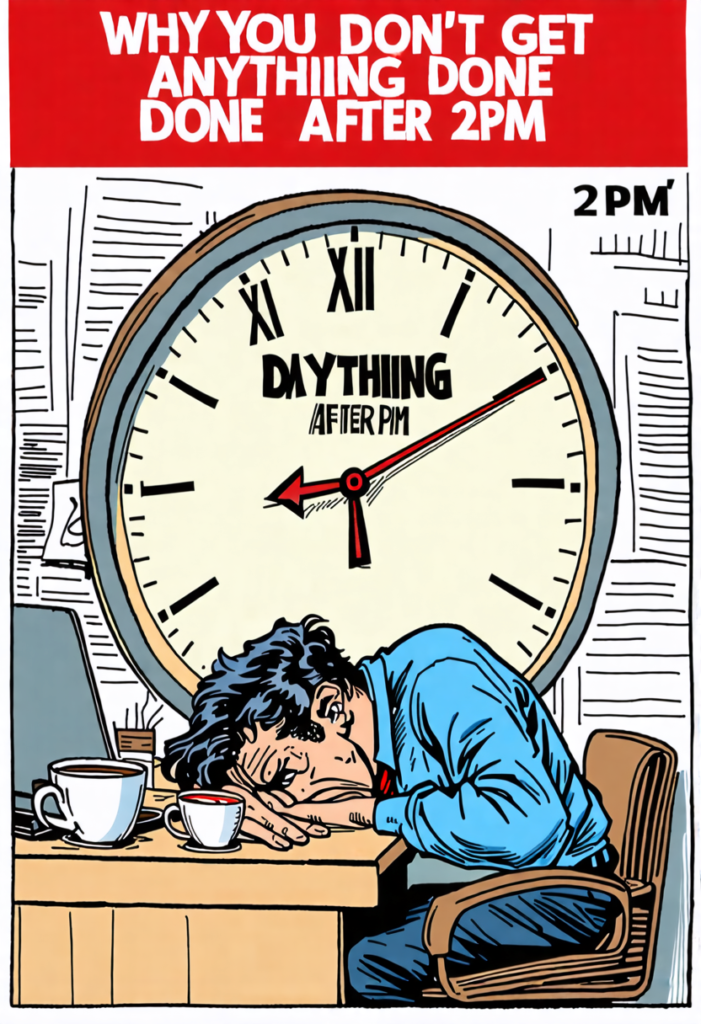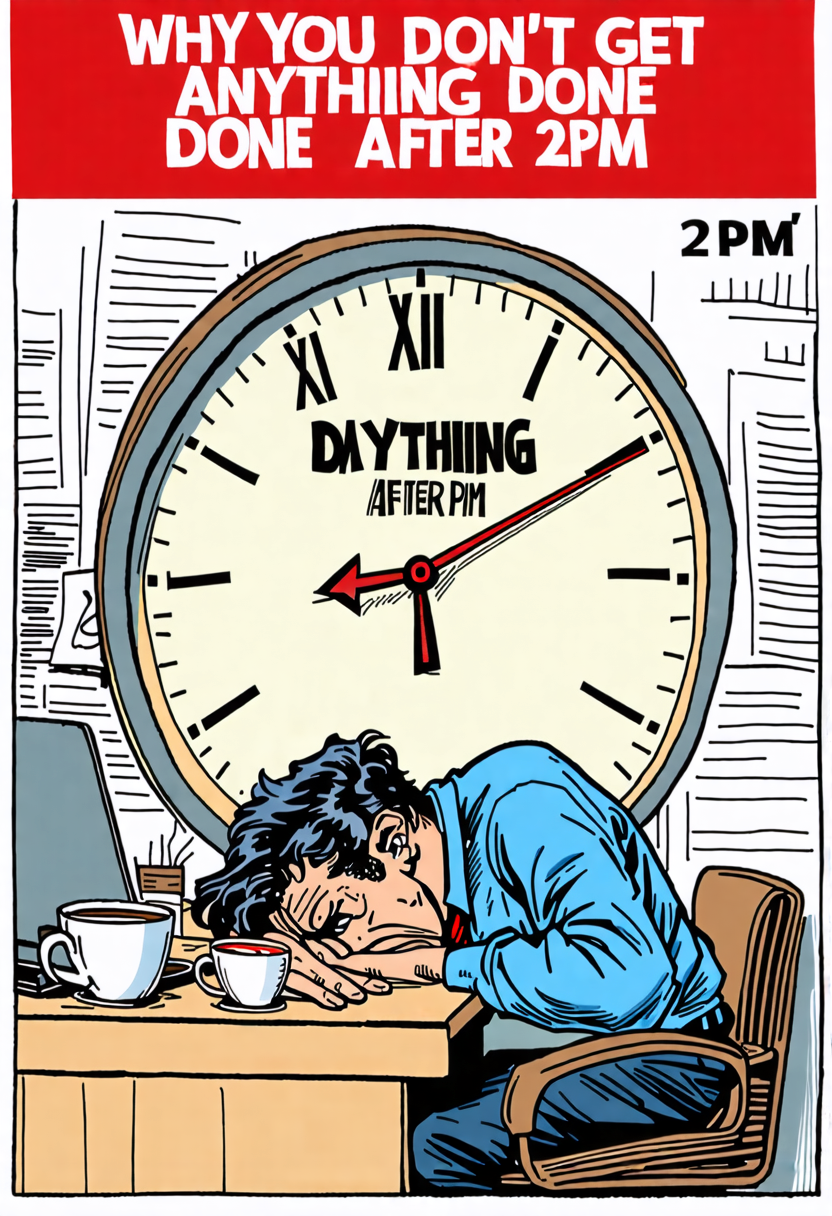Why You Don’t Get Anything Done After 2pm?
After 2 pm, productivity can drop due to dietary habits and physical activity levels. Eating balanced meals and staying hydrated are essential; skipping meals and choosing sugary snacks drain energy and reduce focus. Prolonged sitting decreases alertness, while short breaks for stretching or walking boost circulation and refresh the mind. Incorporating upbeat music can also enhance motivation and mood.
Small adjustments, like frequent meals, regular hydration, and movement, can make a significant difference.
The Role of Nutrition
Proper nutrition plays a critical role in maintaining productivity throughout the afternoon. Consuming balanced meals helps regulate insulin levels, which in turn stabilizes energy. Instead of a large lunch, opt for smaller, frequent meals to keep energy levels steady.
Avoid sugary snacks that can cause quick spikes and crashes in blood sugar. Including protein and complex carbohydrates can provide sustained energy. Hydration is equally important; drinking enough water can prevent fatigue and support cognitive functions.
Impact of Skipping Meals
Skipping meals frequently can greatly reduce productivity levels in the afternoon. When you skip a meal, your blood sugar levels can drop, leading to feelings of fatigue and difficulty concentrating. This can severely impact your ability to complete tasks efficiently.
Here are three key impacts of skipping meals:
- Energy Depletion: Without adequate nutrition, the body lacks the necessary fuel to maintain energy levels, making you feel sluggish.
- Poor Cognitive Function: Low blood sugar can impair brain function, reducing your ability to focus and make decisions.
- Mood Swings: Hunger can cause irritability and stress, further diminishing your overall productivity.
Physical Activity Benefits
Engaging in physical activity throughout the day can greatly enhance afternoon productivity. Sitting for long periods can decrease alertness and increase fatigue. Taking short walks or performing simple stretches can refresh the mind and body.
Stretching or doing yoga can combat fatigue, promoting a sense of wakefulness. Exposure to bright light during breaks can also improve alertness. Regular movement increases circulation and energy levels.
Short, frequent breaks involving physical activity are more effective than long, infrequent ones. This helps maintain a steady state of productivity throughout the afternoon. Incorporating these activities into your daily routine can markedly boost your overall efficiency and well-being, helping you stay focused and alert even after 2pm.

Power of Music
Listening to upbeat music can greatly enhance your afternoon productivity. Music has a profound effect on mood and energy levels, which can help combat the common post-lunch slump. It is important to choose the right type of music to maximize these benefits.
Here are three key points to keep in mind:
- Energizing Tunes: Select music that makes you feel energized and motivated.
- Volume Control: Be mindful of the volume, especially in shared workspaces, to make sure it is not disruptive.
- Playlist Management: Regularly update your playlist to keep the music fresh and engaging.
Effective Habit Changes
Implementing small but effective habit changes can greatly enhance your afternoon productivity. Start by tweaking your eating habits. Opt for smaller, frequent meals instead of large lunches to maintain stable energy levels.
Hydration is vital; make sure you drink enough water throughout the day. Incorporate movement breaks into your routine. Short walks or stretching can refresh your mind and combat fatigue.
Adjust your music choices to energize you during afternoon tasks. Upbeat tunes can keep you alert. These slight modifications in your daily habits can lead to significant improvements in focus and efficiency.
Consistent effort in making these changes will help you overcome the productivity dip that often occurs after 2pm.
Combatting Afternoon Slumps
To effectively combat afternoon slumps, consider integrating various strategies into your routine. Small changes can have a big impact on your productivity and energy levels.
Here are three key strategies:
- Nutrition: Opt for smaller, frequent meals instead of large lunches. Avoid sugary snacks, which can cause energy crashes. Stay hydrated throughout the day to maintain alertness.
- Physical Activity: Take short walks or stretch during breaks. Movement helps refresh the mind and boosts energy levels. Exposure to bright light can also improve wakefulness.
- Music: Listening to upbeat music can help combat drowsiness. Choose tunes that energize you but be mindful of volume levels in shared workspaces.
Implementing these strategies can help you stay productive and energized throughout the afternoon.
Strategies for Productivity
Effective strategies for productivity include optimizing nutrition, incorporating physical activity, and choosing energizing music.
Eating smaller, frequent meals instead of large lunches can stabilize energy levels. Avoid sugary snacks and stay hydrated to prevent afternoon slumps.
Taking short walks or stretching breaks can refresh the mind and boost alertness. Exposure to bright light during breaks can also improve wakefulness.
Listening to upbeat, energizing music can combat drowsiness and improve mood. Be mindful of volume levels in shared workspaces to maintain a conducive environment for everyone.
Adjusting your playlist and incorporating these strategies into your routine can greatly enhance afternoon productivity. Consistent effort and experimenting with different approaches can help you find what works best for you.
Prioritizing Well-Being
Prioritizing well-being is essential for maintaining consistent productivity throughout the day. Small changes in daily routines can greatly impact energy levels and focus, especially in the afternoon.
Here are three critical areas to take into account:
- Nutrition: Eating smaller, frequent meals keeps energy stable. Avoid sugary snacks to prevent energy crashes. Stay hydrated to sustain focus.
- Physical Activity: Short walks and stretching can refresh the mind and combat fatigue. Movement boosts energy, helping to stay alert.
- Music: Listening to upbeat music can enhance mood and productivity. Adjust your playlist to find what energizes you without disturbing others.
Frequently Asked Questions
How Does the Circadian Rhythm Affect Afternoon Productivity?
The circadian rhythm, a natural body clock, influences energy levels, causing a dip in alertness during the afternoon. This biological process can lead to decreased productivity and increased fatigue, impacting work performance and efficiency.
Can Sleep Quality Influence Energy Levels in the Afternoon?
Yes, sleep quality greatly influences afternoon energy levels. Poor sleep can lead to fatigue and decreased alertness. Ensuring adequate, restful sleep is essential for maintaining consistent energy and productivity throughout the day.
Are There Specific Psychological Factors That Cause Afternoon Slumps?
Yes, specific psychological factors can cause afternoon slumps. These include mental fatigue from sustained focus, stress from workload demands, and reduced motivation. Addressing these factors through breaks and stress management can improve afternoon productivity.
What Role Does Stress Management Play in Maintaining Productivity?
Stress management is essential for maintaining productivity. Reducing stress helps maintain focus, energy levels, and mental clarity. Techniques such as deep breathing, mindfulness, and regular breaks can greatly improve overall work performance and efficiency.
How Does Office Environment Design Impact Afternoon Work Performance?
Office environment design has a substantial impact on afternoon work performance. Factors such as lighting, noise levels, ergonomic furniture, and air quality can influence worker alertness, comfort, and productivity, leading to improved focus and efficiency throughout the day.








